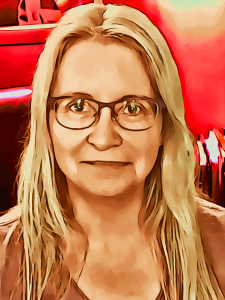174 Letter from Heather Mair

Dear future tourism researchers (who also happen to be women)
I’ll start with a confession: I made the mistake of reading some of the other letters included int this volume before sitting down to write mine and now I feel like I have nothing interesting to say. So, I guess my first piece of advice is to put down on paper (or computer) what you want to say and don’t worry about what others are saying or doing.
During my career, especially in the early days, I often found myself going against the grain. In 2001, I decided to use qualitative case study methodology for my doctoral degree and can still remember having to tolerate a professor in my school saying that qualitative research was (and I quote) “no better than bad journalism”. At tourism conferences, I was the critical one, always asking annoying questions like: is tourism a good thing? And, (albeit more recently) I find myself asking whether we, as academics, should be travelling long distances – to tourism conferences – knowing what we know about the impact of air travel on climate. Admittedly, this question now seems much less radical after nearly 18 months of the COVID-19 pandemic.
I’d like to tell you that I never worried whether this tendency to ruffle feathers would harm my career in some way. Was some full professor going to remember the time I pissed him off at a conference while reviewing my application for promotion? I came to the conclusion that if academia didn’t want me, I didn’t want academic While I’m not thrilled with the outcome of every single paper and project I’ve been involved with, I can say that my principles are intact. With this privileged position comes responsibility and you can’t ever not say what is important to you.
Speaking of privilege, I’ve also come to understand that not everyone has had access to the same opportunities as me. As a white woman raised in a middle-class family where education was a value and there were means to support me, I know I’ve had it a lot easier than others. And this leads me to my next point.
Help others along the way. As someone who has been deeply involved with supporting our field, I think I can say that I’ve always tried to help others. Here are some ways you can help too: write letters of support for junior colleagues going for promotion, put the names of junior scholars and students at the front of the list of authors on a publication, invite scholars from marginalised communities to write commentaries, join on to projects, give keynotes, or join panels to share their views and put a spotlight on their work. All of these things help our tourism studies community grow and strengthen.
Jump in with both feet. I’ve had the pleasure of being involved with academic associations at all levels. I’ve sat on many editorial boards, organised conferences, put together discussion panels, edited books, handbooks, and conference abstracts and programmes. While these time-consuming activities have the added side-effects of plumping up my CV, they mostly gave me great pleasure. I have been able to get to know scholars from all over the world and it’s immensely satisfying to be part of building our community. I’m a relatively shy person and sometimes being involved in these ways can be daunting, but it has all been more than worth it as I feel I have a wonderful group of scholar/friends with whom I can connect, ask advice, and just enjoy. It’s a really wonderful part of an academic life and I encourage you to embrace it.
And when I feel that it’s all a bit overwhelming and the expectations of an academic life are too high to manage, I remind myself that I am just one woman, sitting at my desk, in a small place, doing small work. I pour another cup of tea and get back to it.
![]()
Heather Mair
University of Waterloo, Canada

